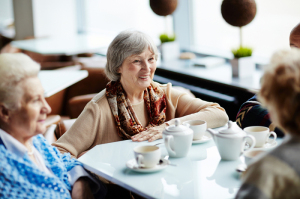Breast cancer survival rates increase for women with more social ties: study
by
Christina Hwang, Contributing Reporter | December 14, 2016

For women battling breast cancer, a strong network of friendships may actually increase the likelihood of surviving the disease.
Researchers from Kaiser Permanente gathered information on 9,267 women diagnosed with stages one to four invasive breast cancer from the After Breast Cancer Pooling Project, a cohort of four studies of women with breast cancer, to gain insight into the correlation between social connections and mortality.
A social network index for each of the four cohorts was created, including information on whether or not women were married, the number of friends and close relatives they had, and whether or not the women had any religious or community ties. The women participated in a survey about their personal relationships and social connections, and were followed for up to 20 years.
They were characterized as socially isolated with a few ties, moderately integrated, or socially integrated with many ties.
"Women who were considered socially isolated varied in situations," lead author Candyce H. Kroenke, Sc.D., MPH, told HCB News. "Some women had a few relatives but not a lot of ties to other organizations, and some were married but had no other ties. Many of the socially integrated women were married, had ties to religions, first degree relatives, and spent time with friends."
Results from the study showed that 43 percent of socially isolated women were more likely to have breast cancer recurrence than socially integrated women. Sixty four percent were more likely to die from breast cancer and 69 percent were more likely to die from any cause.
"Our findings demonstrate the beneficial influence of women's social ties on breast cancer-specific outcomes, including recurrence and breast cancer death," Kroenke said.
She notes that not all types of social ties provided a benefit for the women.
For example, older white women without a spouse were 37 percent more likely to die than older white women with a spouse. However, for women in other demographic groups, there did not seem to be any significant difference in survival rates whether or not they had a spouse.
Additionally, non-white women with few friends were 40 percent more likely to die than non-white women with many friends, a relationship that was not apparent in white women.
"There is some literature that provides some context for this observation," said Kroenke. "For example, white women are more likely to report a spouse as a caregiver and nonwhite women are more likely to report informal caregivers as friends and family. This is consistent to findings that we had."
“Ultimately, this research may be able to help doctors tailor clinical interventions regarding social support for breast cancer patients based on the particular needs of women in different sociodemographic groups,” she said.
|
|
|
You Must Be Logged In To Post A Comment
|
